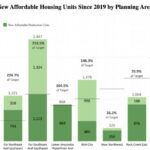By Washington Business Journal, March 3, 2023
Prince George’s County lawmakers on Tuesday passed a controversial bill imposing rent stabilization, often termed rent control, effective through 2024.
The Rent Stabilization Act of 2023, which the county council approved 9-1 with one absence following an hourslong public hearing, prohibits certain residential landlords from raising rents more than 3% per year for one year, starting in April. First violations are punishable by a $500 fine, and each subsequent violation, by a $1,000 fine. New units, or those having received an initial use and occupancy permit in the last five years, are exempt, as are affordable units with affordability covenants owing to public subsidization or support.
The bill passed resoundingly, with supporters applauding the effort to prevent unwarranted price hikes for renters, particularly those in need and enduring more precarious financial times. Critics, however, say that in the long run, such a measure won’t achieve its desired end of helping lower-income people, and can have the opposite effect.
The council will also establish a working group “to study permanent rent control in Prince George’s County” and “to identify permanent solutions for effectively addressing the rising cost of rent,” according to a Feb. 28 county council news flash.
“This bill is an opportunity for us to say loud and clear that renters matter,” Councilmember Krystal Oriadha, D-District 7, the bill’s sponsor, said at Tuesday’s hearing. “For too long, the message has been loud and clear that they don’t.”
She said while the bill does not prohibit modest rent increases below the cap, it intends to “take away your opportunity to take advantage of the market” and to employ “predatory practices.”
“This legislation will halt the rent-gouging in Prince George’s County while a more permanent solution is introduced,” Gustavo Torres, executive director of CASA, said in a statement posted on the community organizing group’s website. “The fight for housing justice is far from over, and CASA firmly believes housing is a human right, not a lucrative business.”
The sole no vote was cast by Councilmember Mel Franklin, D-At large. “America tried rent control over half a century ago, and it was abandoned by most jurisdictions because it just didn’t work,” he said at the public hearing. He echoed other opponents in arguing the practice dissuades building owners from investing in maintenance and renovations and reduces the overall rental housing stock by driving landlords to other, less restrictive jurisdictions.
In an interview, he pointed to additional uncertainty going forward on whether the council might renew rent stabilization after the current law expires, or replace it with something similar — and whether that might decrease a would-be developer’s ability to forecast revenue and, thus, secure financing.
Rent stabilization may make lenders increasingly skeptical of a landlord’s ability to generate sufficient revenue to repay their loans, making it harder for them to obtain financing for major capital improvements, said Alex Rossello, spokesman of the Apartment and Office Building Association of Metropolitan Washington, which didn’t support the bill.
Prince George’s County Executive Angela Alsobrooks supported the bill, per the county council news flash. Angie Rodgers, who heads up economic development for the county, said the Alsobrooks administration will work with stakeholders “to develop data-driven approaches” to expand housing affordability efforts in a statement that didn’t directly address the rent stabilization issue.
Recommended
Some property owners and managers say they’re not categorically against price controls, but that restrictions should be looser.
Rossello said his organization broadly supports a bill Franklin has introduced, CB-24, which would prohibit “rent gouging,” defined as a rent increase of more than 20% year over year, or 10% for certain residents of senior or veteran housing. That bill would exclude redeveloped or majorly renovated properties. It would also establish a county fund to assist qualifying lower-income tenants in paying for rent hikes of more than 5%.
In the next county over, Montgomery County Council members unveiled Thursday what they’re calling “Tenant Assistance and Protection package,” which includes an anti-rent-gouging provision that caps rent increases in multi-unit buildings at 8%, plus inflation. It would also add $18 million to the county’s Rental Assistance Program, bringing the total to $30 million. Rent stabilization has also been a hot topic in that jurisdiction.
“A more efficient way to ensure that low-income households receive the benefits of rent regulation is to pair broad-based, anti-gouging rent regulation with target subsidies that reduce housing costs for low-income tenants,” Doug Firstenberg of developer Stonebridge told a Montgomery County Council committee Jan. 30, quoting a 2021 New York University study.
Gabrielle Duvall, executive vice president and general counsel for Southern Management Cos, told the same committee she’d support “a robust anti-rent-gouging bill,” which “would prohibit the bad actors, the anecdotal stories you’re hearing about the people who are raising rents 15% to 30%, for no reason other than because they can.”
“Rent stabilization and rent control is a distinction without a difference to our investors and our financiers,” she said. “Anti-rent-gouging is something they can live with, without impacting our ability to finance and our ability to continue maintaining our asset.”
While a Prince George’s County Council committee later this month will consider Franklin’s bill, neither Franklin nor Rossello say they think it stands much chance of becoming law. Councilman Edward Burroughs, D-District 8, referred to it as “the other bill that will die,” saying at the public hearing that a 10% rent hike is still too high and adding that some seniors have told him they already must “choose whether or not to pay their rent, or to eat or to even go to the doctor.”
Click here to read the full article.







